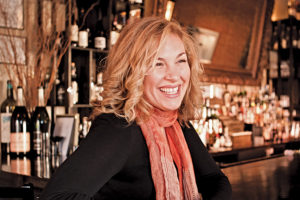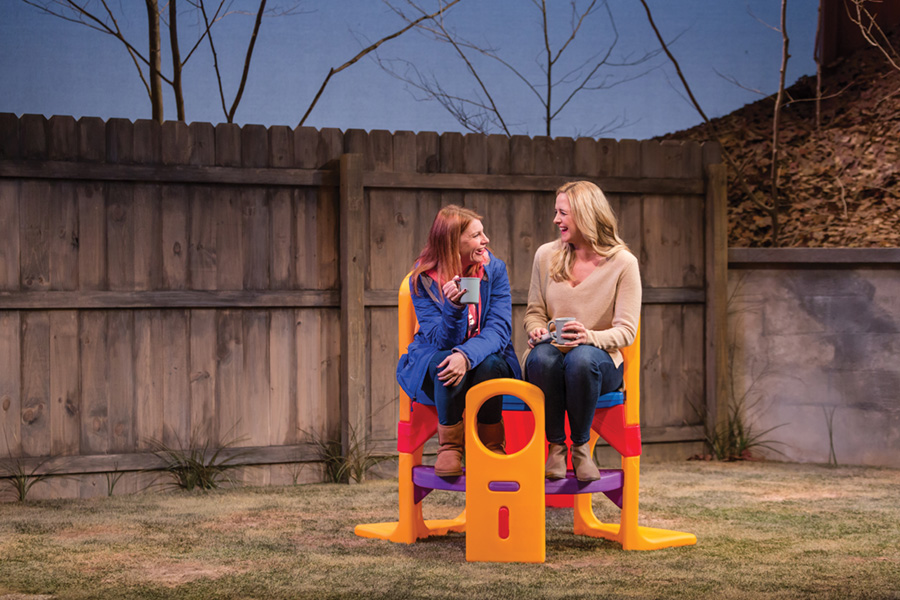
In Molly Smith Metzler’s play Cry it Out (available in the December print issue of American Theatre)two Long Island moms with newborns, Jessie and Lina, bond over coffee in a backyard. When a nearby stay-at-home dad, Mitchell, offers to join them, it complicates the neighborly camaraderie, not least because he’s clearly upset that his wife, Adrienne, is putting her career first. Playwright Dominique Morisseau (Pipeline, Skeleton Crew), who writes with Metzler on the Showtime series “Shameless,” sits on the board of the Detroit Public Theatre, where Cry it Out is now playing (Nov. 15-Dec. 9). The two writers spoke recently about parenting, playwriting, and the male gaze.
DOMINIQUE MORISSEAU: It’s funny, when I first heard the title Cry it Out, perhaps because I’m not a mom yet, I wasn’t thinking of it in the way the phrase is used in the play. I was thinking of it like, we’re crying out to the world, you know? Can you talk about how you chose your title?
MOLLY SMITH METZLER:I was almost done with the play and I still didn’t have a title. I was super-stressed out about it, because I had only bad ideas, like Two Coffees in a Yard, or Over Coffee. Just horrible. Then I remembered that the two main characters briefly talk about the “cry it out” sleep method — a disputed, controversial method of “teaching” your baby to sleep through the night by leaving them to scream their lungs out. It’s aggressive, and it’s not unlike what new parents go through: It’s terrifying and you can cry out for help all you want, but no one is coming to your side with answers. You have to figure it out on your own. So I liked this idea for a title, and selecting it actually helped me finish the play because I started writing towards it. To earn it as a title. And I wanted it to make sense in a bunch of ways, so I’m thrilled you experienced it the way you did. I don’t think Coffee Klatch would have had quite the same effect, do you?
The word “cry” is in the title. Do you feel like people carry a bias against that word itself, coming from a woman writer?
It’s funny, I’ve attended three productions of the play so far, and at all three, people have come up to me afterwards to say they were surprised it wasn’t a “chick play.” I think the title leads people to expect something soft, with lots of tears and breast milk. Which is not completely inaccurate—there’s plenty of breast milk. But what’s surprising is who is doing the most crying: the male character. He’s the one “crying out” most loudly. It’s an important texture of the story. To me this play is about the challenges facing new parents. It’s about how unfair the socioeconomics of child care are in this country. It troubles me when the play is marketed as a “chick play.” That’s only 50 percent of who should be in the house. And it’s contrary to the play’s point: that parenthood isn’t a women’s issue.
Was this originally a play between women, and then somewhere along the way you’re like, “Hey, I wanna hear from a guy,” or did you know all along that you wanted his perspective to be a part of the play?
I knew all along that I wanted his perspective to be a part of the play, mostly because I was interested in writing about modern marriage and how it changes when you become parents. I’m really lucky—I’ve got a fantastic partner in life and in art, my husband, Colin. The first two and a half years of my daughter Cora’s life, I was home with her, and then things switched up—we moved to Los Angeles and the last two and a half years, Colin’s been the primary caregiver. We have both done it, we’ve done it equally, and it didn’t seem fair to talk about the trials and tribulations of having a newborn without honoring more than one perspective. It was really important to me to get Mitchell in there. And I’m glad he is.
When I look at your character descriptions, you explain the layered history of what these characters represent socioeconomically. Why is class so important in this story?
New parenthood is the perfect lens through which to examine socioeconomics. People talk about going back to work after you have a child like it’s always a choice. Or they make it a feminist issue, making new mothers feel like they’re stuck in the 1950s if they want to stay home, or they’re cold-hearted careerists if they don’t want to stay home. We make it black and white, and we’re so judgmental. But it’s a very complicated, personal, emotional, and financial thing.
We had a daughter at a time in my life where we did not have money. It was shocking to wake up one day and realize that I did not have the money to send my daughter to the outstanding pre-school that I wanted to send her to, that I didn’t have the money to get a nanny, that I did not have the money to get a babysitter so I could write a play. We don’t actually talk about it, but it’s a socioeconomic issue in this country, who gets to have the luxury of choice. Many people do not get one.
So here I was with a newborn, grappling with this very thing, while living in a town that was divided by class, in a visual way. Port Washington, N.Y., the city, is made up of a couple of different villages. Manorhaven, which is on sea level, is working-class and mostly rentals and duplexes, some of which are Section 8 housing. It’s very diverse and family-friendly, so that’s where Colin and I lived. But literally right above Manorhaven, staring down at us from a cliff, is Sands Point, one of the wealthiest villages in the country. A bunch of really famous people live up there. And they’re truly looking down from their palatial estates over this rental community in Manorhaven. I would go for walks and look up at the cliffs and be like, “How can I not write about this? This is incredible. Our kids are all gonna go to the same school, but our experiences are so different.”
Is there some place where motherhood and parenting defies socioeconomics?
The equalizer is friendship. That’s what was wonderful about my maternity leave in Port Washington. I can’t think of another time in life when you get to make new friends as an adult. You’re home with a baby, you need to socialize the baby, and you need company to survive. So for the first time in decades, you’re out at the library or coffee shops trying to make a new friend. I remember baking elaborate banana breads and trying to lure potential friends back to my crappy duplex. Finally I met the world’s nicest new mom and she saved my life by introducing me to the new parents in the community. We were from all walks of life, from Sands Points to food stamps. We had nothing in common except one huge thing: We all had little newborns.
That’s why I cross my fingers that the play feels hopeful at the end. The characters may not have easy answers to their questions, but at least they have each other. I’m still friends with all the parents that got me through that time in my life. They’re not people I would’ve ordinarily gotten to meet, but now they are some of my most cherished friendships.
Can we branch out just for a quick second? You’re a working mom writer, and I wonder if you experience some things that I experience in a different way being a Black woman writer. The million-dollar question for me is always the gaze under which I write. I’m always wrestling with the white gaze, the male gaze, the Black gaze, the white male gaze, the Black male gaze. I’m writing with a lot of gazes. Have you come up against any kind of male gaze in relationship to the play that has informed how you talk about the play now in conversation or in the press?
I’m so glad you asked me that question. First of all, this play is being programmed all over, so I’m not gonna complain. The gaze does not seem to be getting in the way of the play too much.
I will say, though, that when our beautiful production opened at Humana, there was one New York theatre I was especially excited was gonna see it. Because I felt like, “Now this is the play of mine they’re gonna spark to.” But the feedback I got from the male artistic director afterwards was shocking—basically his critique was, “I just wish the protagonist had changed. She doesn’t change in this play.”
His dismissal of Jessie’s arc really stayed with me. Yes, I’m a working mother and yes, I’m a female playwright, but to me, his statement is indicative of a much larger problem: the antiquated male aesthetic. It just needs to go the hell away already. The protagonist in Cry it Out changes so much it’s gobsmacking to say otherwise. Ask any female who has watched the play. Jessie has a full and contemporary arc with a distinctly female POV. It’s straight up wrong that any man, let alone an artistic director, would dismiss and minimize what she goes through. What he should’ve been doing was listening to her.
Do you think that they can’t see the shift the woman is having, but if it were under a male perspective that shift would be so much more obvious?
I’ve given it a lot of thought, and my guess is that it’s just not a recognizable arc to some men. Motherhood is not a topic that’s onstage often, and women are rarely onstage period. Maybe they actually do not know how to experience it? So it’s easier to reject it? Interestingly, I don’t run into this in television and film as much. They want complicated, honest female characters and they want them to star.
But I’m honestly really grateful for that early feedback, because it made me front-footed about it all. Now when we go into rehearsal, I warn the cast up front. I say: This play will make people uncomfortable. How we raise our children is a triggering topic, as is a woman’s role in the home. There’s a cloud of sexism around these issues. But that doesn’t mean we can apologize for the play. We cannot soften Adrienne, and we cannot answer Jessie’s question for her. We can’t mute or alter this play to protect the people who won’t go on the ride. Our job is to tell it raw and ugly, like it really is.
CORRECTION: The original post of this story, and the December print issue of the magazine, erroneously stated that Morisseau sits on the board of Detroit Repertory Theatre and that Cry it Out played at that theatre.








